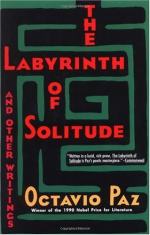
|
| Name: _________________________ | Period: ___________________ |
This test consists of 5 multiple choice questions, 5 short answer questions, and 10 short essay questions.
Multiple Choice Questions
1. How did the Revolution relate to reality?
(a) It subtly altered the past idea of reality.
(b) It was a sheer explosion of reality.
(c) It denied reality.
(d) It brought about a new idea of reality.
2. Who authored. the book, Profile of Man and Culture in Mexico?
(a) Jorge Cuesta.
(b) Samuel Ramos.
(c) Jorge Scheler.
(d) Christophe Adler.
3. Which of the following contributed to making colonialism alive and relevant?
(a) Native acceptance.
(b) Imperial takeover.
(c) Catholicism.
(d) Violence.
4. Why did the Mexican Revolution have to begin before the beginning?
(a) Mexico did not have the basic electricity and resources needed to transform her cities.
(b) In the early 20th Century, Mexico was far behind the advanced world.
(c) The cities were not large enough to house the farmers-turned-workers.
(d) The people still held a feudalistic mindset.
5. What event precipitated Spain's complete loss of power?
(a) The loss of her naval supremacy.
(b) Mexico's revolt against her.
(c) Her strong monarch's death.
(d) Her faith losing all potency.
Short Answer Questions
1. In Paz's argument, how have tradition and religion always been presented to the Mexicans?
2. What did Manuel Gomez-Morin accomplish for the Revolution?
3. When did the Plan of Ayala go into effect?
4. According to Paz, what is the "contemporary crisis"? (Chapter Seven, page 172).
5. How did liberalism and democracy function in South American countries?
Short Essay Questions
1. Pulling from the ideas of Jose Gaos, Paz, speaks of the physical duality in Mexico. What does that mean? What significance does that idea have?
2. How does Paz define "Mexicanism"? How does it mesh with the individual whom he had described earlier?
3. When did Independence begin in Mexico? How was it similar to or different from the Conquest?
4. Who was Sor Juana? Why was she an unusual person both in South America and in old Spain?
5. How did Catholicism reduce the Indian converts into passive believers? How was that a significant blow?
6. Why did the new Constitution mandate that education be secular? How might that have made the Mexicans feel?
7. What happened when Spanish America separated itself from Spain? Given what Paz has stated throughout the book about that moment in history, draw your own conclusions about why that happened.
8. What role did Catholicism play in the lives of the conquering Spaniards? Was that role contradictory?
9. Mexico has entered a new phase of thinking and history. How does Paz explain that phase?
10. What did Article 3 of the new Constitution mandate? What troubles did that Article cause?
|
This section contains 1,810 words (approx. 7 pages at 300 words per page) |

|




